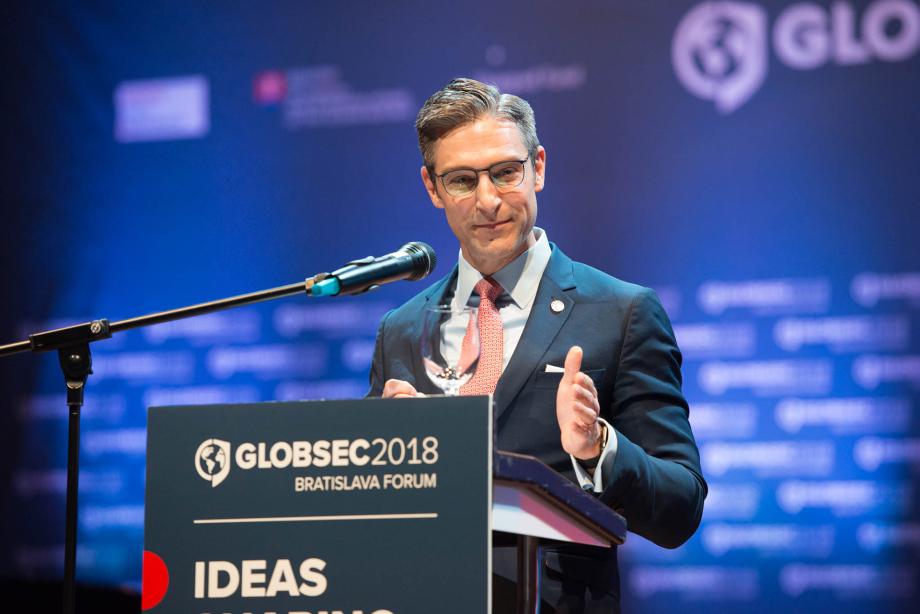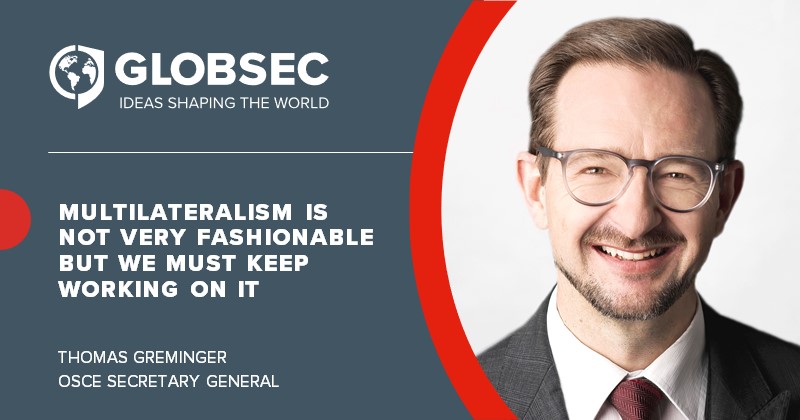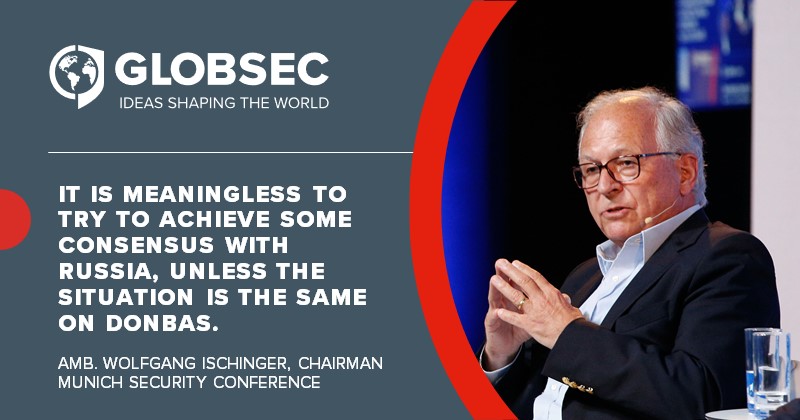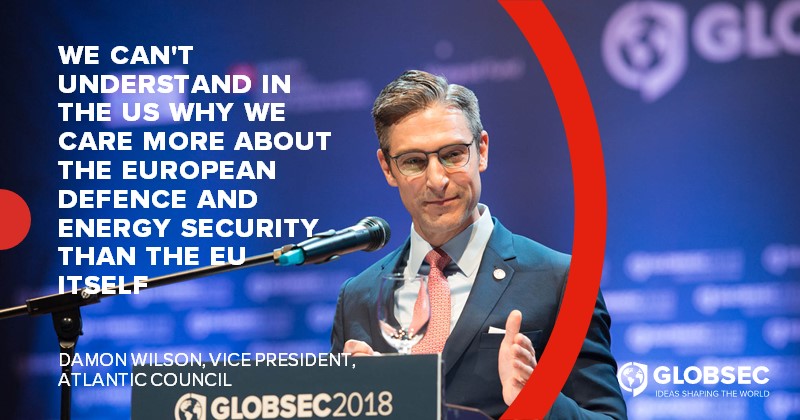GLOBSEC 18 by Issues: Defence and Security

In keeping with previous years, the content discussed and delivered at GLOBSEC Bratislava Forum 2018 was based around key thematic clusters. What follows are summaries of talking points, important comments, photographs and social media commentaries related to panels covering: current relations between Russia and the West; multilateralism in a 'me first' world; the need for an updated NATO strategy; the current security situation in the Middle East; the current state of transatlantic relations; projecting power in a post-rule world order; and the current defence and security dynamics shaping the Korean peninsula.
The West and Russia: Managing the Flashpoints
Numerous volatile situations around the world require Russia and the Western world to work together to find peaceful solutions. In places like Ukraine, Syria and the rest of the Middle East where tensions are running high and diverse ideologies could led to further conflict both regionally and globally, it is necessary for the West and Russia to find common ground and strategies. Still the discussion left little ground for optimism for finding compromise between Russia and the West. Russia seems to have digged in believing that its will to compromise in the past has been abused by the West hence it would not move under pressure of sanctions, in fact its resolve would only grow. The West is prepared to open a discussion that could lead to sustainable solution for Donbas and other areas of major disagreements. Russia wants to dialogue and wants to improve relations with the West but without compromising on the issues such as Ukraine or Georgia, which the West considers of major importance.

Key points of discussion:
- Assessment of the state of the relationship:There was a broad agreement that the West-Russia relationship is a a very low point. There are serious dangerous of further escalation as there is no meaningful dialogue in place.
- Impact of the sanctions:there were differences about the assessment of the impact of the sanctions imposed by the West on Russia following the take-over of Crimea. The Russian participant claimed that the sanctions had no major impact and that they have in fact helped the defence industry to become self-sufficient. Other speakers saw the sanctions as having a major negative impact on the Russian economy.
‘‘The Iran deal hurts and will have an impact on Russia-West compromise.”
Amb.Tomáš Valášek, Director, Carnegie Europe
- Steps that could lead to the improvement in the relationship: several ideas were flouted but western speakers agreed that finding a solution to the ongoing violence in Donbas should be a starting point. The Russian participant saw a chance in a meeting between President Trump and Vladimir Putin.
- Transatlantic Differences:European participants and audience stressed that the American policy on Russia is ambivalent. On one hand the administration and Congress run an assertive policy towards Moscow, on the other hand President Trump is looking for an accommodation in the relationship. US decision on Iran has brought bad blood to the transatlantic relationship and it eroded trust.

Multilateralism in the “Me-First” World with No Rules
The 20th century design for multilateral processes and institutions has been challenged by new the wave of inward looking where No Rules is the new norm. This was the subject of the Multilateralism in the “Me-First” World with No Rules session.
Main takeaways:
- World needs a Multilateral Renaissance - a term proposed by H.E. Miroslav Lacjak - to overcome current downturn in terms of security and global coexistence. This should come with rethinking of not what is being said but how it is being said. Dialogue is the key message and it should aim at balancing conflicting narratives
- The two conflicting narratives are today multilateralism with anti-multilateralism but the critics have no other constructive proposal on the table. This is also why the current UN design is the best working and universally acceptable format, including vero mechanism in the Security Council. In fact the existence of UN helps other formats like G8 or OSCE to develop and change
After the keynote by the Slovak Minister of Foreign Affairs the topic of multilateralism was addressed jointly by Hon. Thomas Greminger, Secretary-General, OSCE, H.E. Vassily Nebenzia, Permanent Representative of the Russian Federation to the United Nations and Amb. Mark Lyall-Grant, former Permanent Representative of the United Kingdom to the United Nations in a session moderated by well Nik Gowing.
“UN is advantageous for China. China speaks differently that the rest of the world, but when it speaks so, it also does so.”
Vassily Nebenzia, Permanent Representative of the Russian Federation to the UN
The world has changed in the past few decades, and each country is becoming ever more focused on fulfilling their own needs. However, to combat issues which are larger than any one country (i.e., nuclear proliferation, climate change, international trade), we need multilateral platforms to open up both traditional and more modern lines of communication.
There are new challenges to the political stability that are manifested nearly simultaneously in different places of the globe such the rise of populism after Brexit and Central European, or use of chemical weapons by state actors, there is militarization of South-China sea and some countries also start like Egypt or Indonesia moving backwards, instead of transforming towards democracy. These do put additional constraints on the UN but it remains the only universally accepted multilateral platform and today - despite some reservations - serves to engage also those who at first sight seem not to align with universal principles like China.
“I am standing here, for one main reason: I want to call for a multilateral renaissance.”
Miroslav Lajčák, President of the 72nd Session of the United Nations General Assembly
The debate took an angle at the case of Russia in the UN. As Nik Gowing observed - many blame Moscow for leading the self-centred agenda - provoking an informed response by H.E. Vassily Nebenzia. In the response we heard that multilateralism presumes diversity but building like-minded initiatives and blaming those who don’t join in is not exactly an multilateral approach. He stressed that it is still the same world order as created in 1945 and there is no new paradigm coming.
The audience was engaged in several exchanges asking questions of both philosophical nature of how to reverse me-first narrative to very practical ones like plans for the Slovak OSCE presidency scheduled for the upcoming year. Bobo Lo, a moderator of one of the previous sessions hinted to involving more countries in the
New Days, New Threats: Adapting NATO’s Strategy
Main takeaways:
- NATO’s current capabilities falls short of the need to protect all the nations of the Alliance, which means we need to coordinate efforts to maximise their effect.
- NATO has been adapting to face the hybrid and cyber threats. The upcoming NATO summit will deliver new reform of the command structure to meet these threats.
- There is no doubt that NATO would come to the defence of the Baltic States in case of a Russian attack.
- Much attention has been on reinforcing the Eastern flank of the Alliance. It is important that the southern flank is also adequately reinforced
Summary: Since the Warsaw summit, NATO members have committed more funds to developing their military and security framework. However, it is time to adapt NATO’s overall strategy to meet the new threats facing the alliance today. There is an upward trend regarding defence spending, 8 of NATO members are spending now above 2% of their GDP but most are still falling short of meeting their spending commitment. Moreover, few states spend 20% of the pledged 2% on modernisation as stipulated at the Alliance summit in Warsaw in 2016. NATO must also adapt to the new threats that materialised in recent years, in particular the threat of terrorism, cyber and hybrid warfare. The upcoming NATO summit will reform the command structure to meet these threats.
“It is peaceful in the Baltics because we were successful in the Baltics. The same should be the case of the Southern flank.”
Jüri Luik, Minister of Defence of Estonia
Other issues raised and discussed:
- NATO must work closer with the EU to deter against the threat of economic energy-related pressure from Russia on Baltic States and other states in the Eastern flank.
- Defence capabilities developed by the EU should be interoperable and compenetary with NATO.
- NATO internal interoperability requires much work. Some of NATO partners (Scandinavians) are more interoperable than some of the member states.
- NATO must do more to work with partners in the South in particular Jordan and Tunisia. This work is essential to the Alliance counter-terrorism effort. Turkey is particularly exposed to the threat of terrorism.
- Iraq is keen to have more NATO training missions.
- NATO presence in the Black Sea is not substantial enough. Turkey’s interpretation of the Montreux convention tends to be too limited to allow for boosting NATO presence.
Polling audience:
- 67% of the audience thought that NATO was very relevant in meeting the 21st century threat.
- 14% thought NATO was relevant
- 2% thought NATO was no longer relevant
“Decision speed is a key essential in the future of NATO.”
Philip Breedlove, former NATO Supreme Allied Commander Europe
Middle East in Turmoil: Achieving Lasting Stability
Numerous civil wars are threatening the status quo in the Middle East region but reaching a more balanced power-sharing system seems far from reach. There are competing interests from all over the world at work in the region, and inter/intra-country tensions flare up constantly which increases the possibility for localised and regionalised conflict. This year’s Globsec conference provided one of a very rare occasion in Central Europe to listen to the Minister of State for Foreign Affairs of the United Arab Emirates bringing key issues for peaceful solutions for the Middle East. H.E. Gargash underlined how much stability in the region is meaningful for UEA and how much hard work is put to achieve it. The regional stability and peaceful solutions in Middle East problems are planned to be achieved, among others, by:
- true alliances and coalition of like-minded arab states, but no interference of other hostile powers (eg. Turkey and Iran)
- coalition in military forces, cooperation with NATO and other stabilisation missions
- international cooperation (eg. India, Europe and Africa)
- not sweeping problems under carpet to deal with extremist issues
- diplomatic solutions
- boosted democratic solutions to problems, rule of law, economic model,
- governance adjusted to ethnic, religious and historic roots, where diversities should be advantage not obstacles
Among all bad news coming from the region, HE Gargash was optimistic towards long-term possibilities, as well as significant transformation in the Arab world. he underlined, this positive message is being popularised among the youngest encouraging them stay empowered and create better future for themselves.
In response to HE Gargash’s speech, Katherine Ashton welcomed the mentioned above principles enthusiastically, putting emphasis on diplomatic means and not sweeping under the oriental carpet of any important issues. Therefore, the Iranian matters need to be addressed however the dialogue is very difficult and ambiguous.
HE Gargash convinced that the US and Europe are close partners to the Middle East, so they need to work and help solve problems, not only balancing these. He, however, noticed that this can make conflicts in the Middle East may grow, although there are good intentions which are focused on small things instead of on the full longterm and fundamental reform. And therefore the process may be prolonging. HE Gargash also found it important to strengthen the arab-core cooperation, and getting rid of Turkey and Iran from the region.
General Allen has pointed on huge gap in between theoretic dialogue and real everyday life. He notices magnificent job of UAE and leadership in the issues in the Middle East against-daesh. He added that the US strategic disengagement in the region nowadays does not mean countries that reform will not receive US helping hand at a later stage.
HE Gargash assessed Palestine-Israel issue as very important to UAE giving 10 points in the scale up to 10 to the matter.
The speakers agreed that not intervening but strong partnering and cooperation with the US and Europe may bring strategic solutions.
The Q and A part devoted to Iran, Izrael and Yemen issues has been engaging to the audience and those in the room were eager to hear more detailed solutions related to these countries.
Trump’s Transatlantic Bond
Main takeaways:
- Transatlantic relations are at the state of crisis, particularly following the Iran decision
- Trump’s decision on Iran hits first and foremost the European companies
- Russia is the main beneficiary of raising oil prices and disagreements between the US and Europe
Summary: The transatlantic relationship is in the state of crisis with the US under the Trump administration. Trump has no attachment to maintaining strong relationship with the Europeans and some of his actions - such as the pulling out of the Iran deal - are harming European interests. At the same time, there is a growing frustration in the US about Europe and the insufficient investment of the European NATO allies in defence. There were many occurrences of disagreement between Europe and the US in the past, such as the war in Iraq, yet, the relationship prevailed. In terms of concrete decisions the US continues and even strengthens its commitment to the defence of Europe. However, the communication coming out of the White House is clearly antagonising to the Europeans. There is a danger of the relationship entering a negative and antagonistic circle.

Other discussion points:
- the tweet from EU Council President Donald Tusk is a clear declaration that the Europeans have had enough.
- the idea of sanctioning by the US European companies trading with Iran is unacceptable to the EU and the EU would need to respond.
- Europe’s assertiveness vis-a-vis the US can lead to a negative circle and still a firmer response from Washington.
- John Bolton as the National Security Advisor will not be very accommodating to the Europeans.
Projecting Power in the Post-Rule World Order
Soft power was a buzz phrase, used in the past few decades, in security circles as it explained the growing influence of world powers beyond the traditional reach. Today, liberal international order is changing in order to accommodate other powers including China. In his fire chat at GLOBSEC 2018, Joseph Nye, Distinguished Service Professor at Harvard Kennedy School of the Cambridge University, convinced that we need to learn that power is not a power over others, but the power with others. Therefore, he stated, unless you work with China or you won’t be able to tell others what to do. And, he continued pessimistically, that President Trump has gone back to the policy of telling others what to do - often via his twitter account - and dominating the agenda.
Professor Nye assured the chat audience that the soft power is still a relevant and influential policy method, allowing to leverage other instruments, enabling environment to deal with issues and influence these. He also finds it available for every-scale country, as even small countries can use soft power in their politics but just with smaller range of options.
Worried that europe may become weak, professor Nye warned on too much euroscepticism which is dominating the public opinion in Europe. We need to believe that Europe, a huge success story, setting frameworks for future important issues, should not be allowed to be torn apart, or rid of the advanced and crucial player position.
Forecasting the scenarios for the future, Nye sees Donald Trump, now dominating the media, will leave behind grown China, and Russia in further decline, whereas US and Europe might get fractured. To avoid such consequences and limit damages Europe and US need to get together to repair issues and go further as stronger partners standing for the same values. Furthermore, Nye provisions that in 82 years, when the world is already in the 22nd Century, China and US will be heading the world but will not grow bigger.
Professor Nye assured the audience that Donald Trump will not get reelected. Surprisingly, he admitted that he would bet for that, but he would not be brave in placing his bet and stick to 10 EUR instead of 10 thousand.
Peace on the Korean Peninsula: No Longer Out of Reach?
Main takeaways:
- Comprehensive agreement is not as much within a reach as it may appear
- Trump has personalised the summit, he may be too desperate for success. Trump could be prepared to accept a deal that makes him look like a peacemaker without going into detail that could ensure actual denuclearisation.
- The summit, if it takes place, will be a historic event - first meeting between US President and a Korean leader - but one shouldn't forget what kind of regime the US is dealing with.
- Russia and China do not seem to expect that DPRK would be prepared to give up its core nuclear capabilities as a result of the summit.
- DPRK has already improved its international image. It convinced China and Russia that it is prepared to compromise. Even if the summit fails other powers would be less willing to blame DPRK for the failure.
Summary:The past several months have seen a turnaround for tensions between the two Koreas and their allies. Expectations are high for the upcoming summit but it is uncertain at this point if the summit may deliver a real and verifiable denuclearisation. The current hype about the summit may have inflated the expectations beyond reasonable level. The US stresses the goal of a full denuclearization of the Korean peninsula but it is unlikely that DPRK will actually give up its core nuclear capabilities in the nearest future. North Korea draws lessons from the Libyan case and considers its nuclear capability to be its live guarantee. In case the summit is successful and delivers an agreement then the next item on the list would be the unification of Koreans.
Other Points discussed:
- Following North Korean attendance of the Olympics trust in South Korea towards the North went up from 15% to over 60%. This may suggest inflated expectations.
- North Korea’s may offer a commitment an eventual denuclearisation and some of its non-essential nuclear capability but its bottom line is to keep its core nuclear capability.
- Japan is cautiously optimistic about the summit but it will expect a full and verifiable denuclearisation. No deal is better than a bad deal.
- Russia has helped DPRK with aspects of economic and energy co-operation. This may suggest that DPRK considers replacing China with Russia as its closest ally.